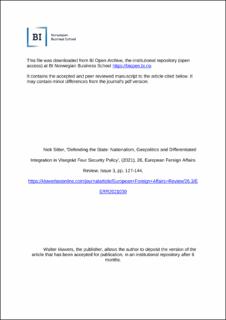Defending the State: Nationalism, Geopolitics and Differentiated Integration in Visegrád Four Security Policy
Peer reviewed, Journal article
Accepted version
Permanent lenke
https://hdl.handle.net/11250/2836961Utgivelsesdato
2021Metadata
Vis full innførselSamlinger
- Scientific articles [2181]
Originalversjon
European Foreign Affairs Review. 2021, 26 (3), 127-142.Sammendrag
During the second half of the 2010s the governments of Poland and Hungary took a sharp turn away from liberal democracy and the rule of law. As they slipped down the international democracy rankings, the European Union initiated its procedures under Article 7 to investigate possible breaches of its fundamental laws and values. However, the two governments sought to distinguish between their conflict with the European Commission over the rule of law on one hand and their commitment to collective security on the other. The central question in this article is whether they managed to do this, and to what extent democratic backsliding poses security challenges for the EU by weakening its actorness in the field of security, defence and foreign policy. A comparative assessment of Poland, Hungary, Slovakia, and the Czech Republic suggests that democratic backsliding does indeed have security implications for the EU, but that this is only one of several factors driving differentiated integration in the Visegrád Four in this field. Developments in the region are part of a wider EU trend of re-nationalization of security policy. Indeed, in the security field, vertical differentiated integration (in the sense of different mixes of supranational and intergovernmental regimes) is a key factor in mitigating the consequences of horizontal differentiation (different Member State policies).
